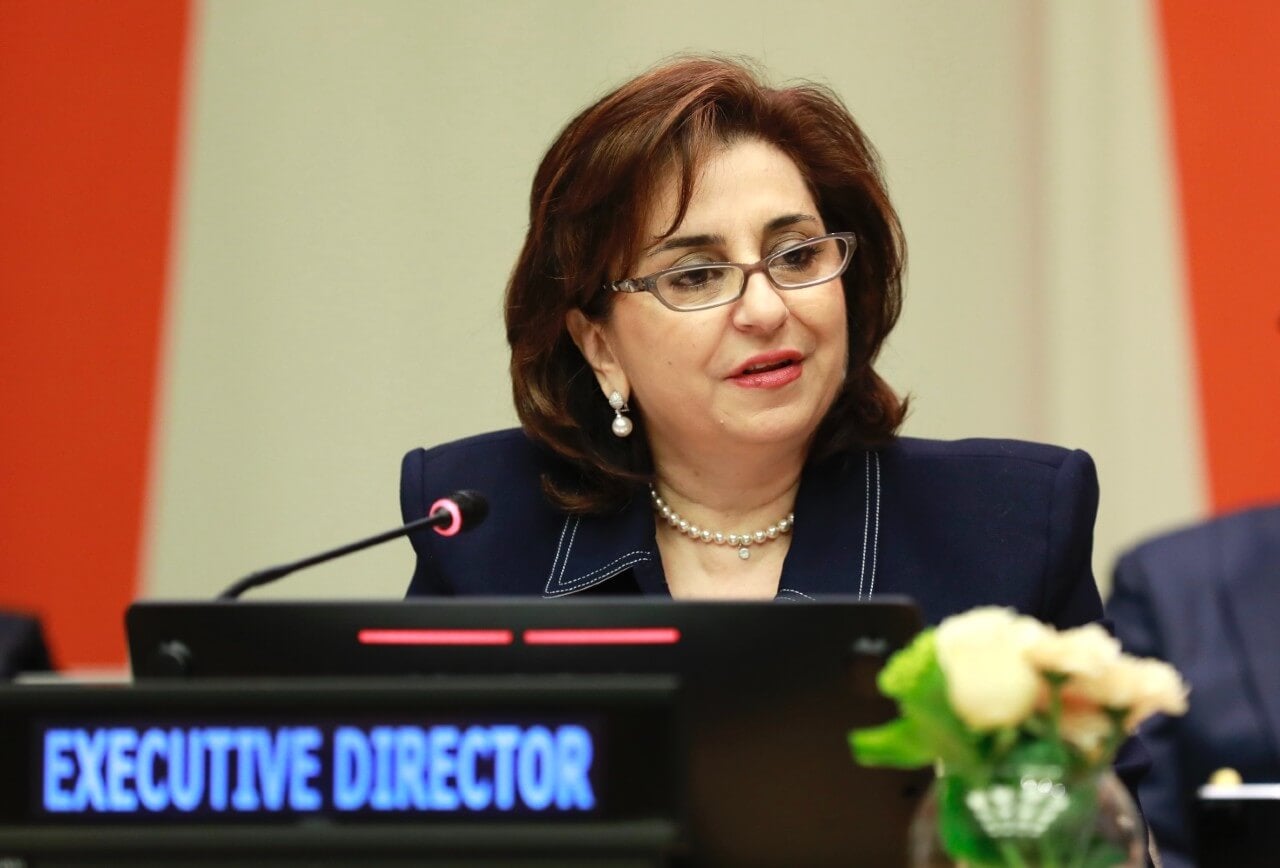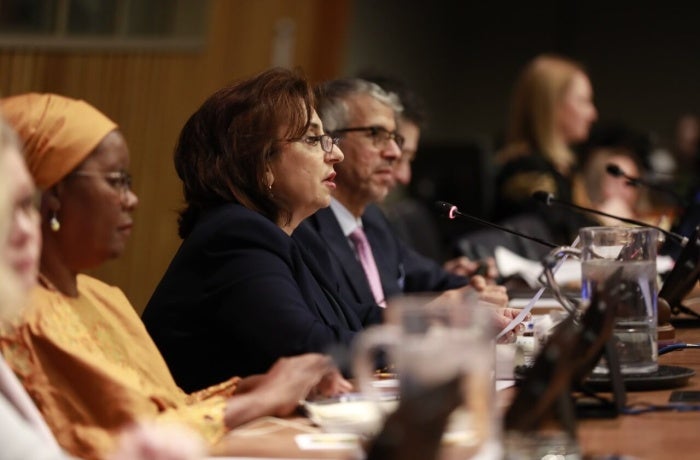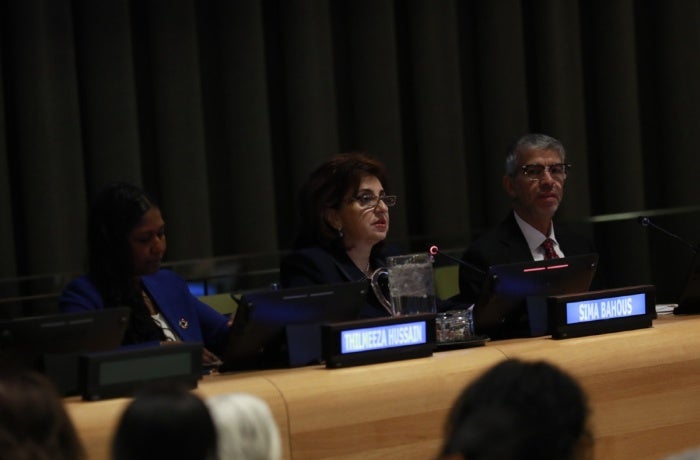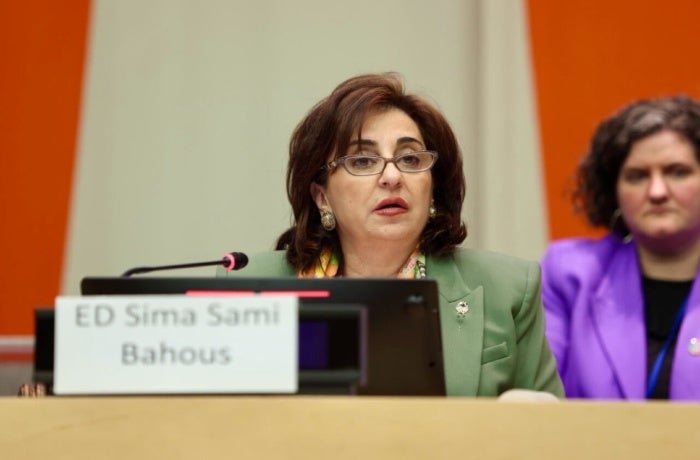Speech: Our commitment: Fulfil our triple mandate, deliver concrete results for women and girls, maximize impact
Opening remarks by UN Under-Secretary-General and UN Women Executive Director Sima Bahous to the first regular session 2025 of the UN Women Executive Board, 10 February 2025, UN headquarters.
[As delivered.]
Welcome to the first regular session of the UN Women Executive Board 2025.
My congratulations to our incoming Executive Board President, H.E. Ms. Nicola Clase, Ambassador of Sweden to the United Nations. Excellency, with you and your team at our helm we are in the most capable of hands. Thank you.
I also warmly welcome our special guest, H.E. Camilla Waltersson Grönvall, Swedish Minister of Social Affairs. Your presence, Excellency, reflects Sweden’s steadfast commitment to gender equality and unswerving friendship to UN Women. We are grateful that you join us today.

My congratulations also to the newly elected Members of our Bureau:
- Vice President H.E. Ms. Suela Janina, Ambassador and Permanent Representative of Albania;
- Vice President H.E. Mr. Walton Alfonso Webson, Ambassador and Permanent Representative of Antigua and Barbuda;
- Vice President H.E. Mr. Umetsu Shigery, Ambassador and Deputy Permanent Representative of Japan; and
- Vice President H.E. Mr. Godfrey Kwoba, Ambassador and Deputy Permanent Representative of Uganda.
I look forward to working with you all, as you offer advice, guidance, and oversight of our work.
Thank you in advance for the many meetings, briefings, and deliberations you will lead. I am confident they will be handled with great success.
I extend my gratitude also to H.E. Ms. Zoraya del Carmen Cano Franco of Panama and her predecessor, H.E. Ms. Markova Concepción Jaramillo, former Ambassador of Panama to the United Nations, who steered our work so ably last year.
Your contributions, alongside those of the 2024 Bureau members from Côte d’Ivoire, Poland, Sweden, and Tajikistan, have raised the bar, and we are grateful for the standard you have set.
Context and vision for 2025
As you know, 2025 is a year of milestones.
Five years to deliver on the promise of the Sustainable Development Goals [SDGs], with SDG5 at its heart.
25 years since UN Security Council resolution 1325 on women, peace, and security, demanding bold action for the 600 million women and girls living in crisis-affected areas. Although they are often the first victims of conflict, they are always, without exception, our greatest hope for peace, security, and recovery.
30 years since the Beijing Declaration and Platform for Action—30 years of progress we proudly celebrate, from stronger domestic violence laws to the rise of youth-led feminism and activism. But the job is far from complete.
The Beijing+30 Action Agenda offers a roadmap, built on your national reports and the six sub-themes of the Secretary-General’s report. We know what must be done, and it’s well within our reach:
- First, bridge the digital gap.
- Second, address poverty, including through social protection.
- Third, end violence against women and girls.
- Fourth, advance women’s leadership and decision-making.
- Fifth, advance women, peace, and security commitments; and
- Sixth, prioritize women and girls in climate justice.
Across these six areas, we have a critical cross-cutting “plus one”: to meaningfully engage young women and girls, the architects of both today and tomorrow.
In our strive for a gender equal world, we must follow this roadmap, for ALL women and girls. Empowering them is key for overcoming today’s many complex challenges.
You will hear these themes many times over this year: at CSW69, at UNGA80, and beyond.
Together, we will demand bold, actionable, and well-resourced commitments to close the gender equality gap and to fulfil our promises.
This year also marks 15 years since the General Assembly established UN Women through resolution 64/289, entrusting us with the mandate to drive gender equality and ensure the world reaps its long-overdue benefits.
We turn 15 in a vastly different operating environment to our establishment, one where multilateral action on the rights and empowerment of women and girls has grown increasingly complex. Development finance continues to decline, while earmarking rises.
In 2024, UN Women’s resourcing underscored the acceleration of these trends, signalling a long-term trajectory of non-core outweighing core resources.
The fact is that in the last two to three years, over half of UN Women’s top twenty core donors have shifted their development policy in ways that weaken support for the UN and for our agency. Some of these adverse impacts are already felt; others we anticipate shortly. While UN Women has been somewhat protected, we are not immune to these trends. For us to fulfil our mandate, it is critical we have the means to reach the women and girls we serve.
With resolution 64/289, our founding resolution, Member States gave us a mandate, supported by Strategic Plans and carefully reviewed Integrated Budgets, to ensure its implementation.
As demand grows and funding declines, I must stress: we cannot do more with less. We have always valued the friendship of our Board, but now more than ever, I ask for a financial commitment that matches this valuable friendship.
As always, we continue to achieve the best possible results with the resources you entrust to us, across our regional offices and our country presences.
This has always been, and will always be, our commitment. And I will remain steadfast in making every dollar count to drive meaningful impact. Given our constrained financial situation, we are taking the necessary steps: containing costs and anchoring our work in our founding resolution and the Beijing Declaration and Platform for Action, as well as other key intergovernmental standards.
In the spirit of operational excellence, I would like to update you on the “pivot to the country and regions”. It is a process that I know many of you are following closely. The pivot is about strengthening our delivery of results on the ground, where women and girls are, and leveraging our triple mandate at the regional and country levels to achieve that.
It is about ensuring there is a clear thread between our crucial global normative work—in New York or elsewhere—and real, tangible changes in the lives of the women and girls we serve.
As you know, we are focusing our budget, prioritizing the country level, and empowering our Representatives and Regional Directors with greater authority. We are also moving some 190 positions from New York to Nairobi and Bonn, where we can be closer to the women and girls we serve and leverage cost efficiencies. Premises are secured in Nairobi and Bonn and will be ready by this July. We expect to save a minimum of USD 8 million a year once the changes are completed—saving an average of USD 52,000 per year in Bonn, and USD 32,000 in Nairobi for each international position we move.
Costs such as rent and security will fall by over two-thirds—from USD 14,000 to USD 4,000 per post—and we anticipate further savings in travel. Perhaps most importantly, these are positions being moved closer to the people we serve, so that they, our people, can serve better.
I know very well that these post relocations are inevitably unsettling and disruptive for some of our workforce, just as they have been for our peers who have undertaken similar processes. I fully appreciate that, and I commend our workforce for the spirit with which they are approaching this. We are also grateful for our Staff Council for its excellent support in making these changes work as best they can for everyone who works for UN Women and for being a key part of our extensive consultations.
We are working with each individual staff member to discuss how their personal situations fit with these changes. Our aim is to make this transition as smooth and successful as possible for our work and our workforce, our people, because, ultimately, our impact is only made possible thanks to our people.
Challenges and back-tracking on gender equality
Despite these organizational shifts, our commitment to fulfilling Member States’ promises to women and girls remains firm.
You know that, globally, in 2024 progress on women’s political participation stalled, with only five women directly elected as presidents. We continue to support women’s political participation across the world, helping amend electoral laws and building capacity of female candidates. We remain resolute in our mission to end violence against women and to drive their economic empowerment, breaking the persistent cycles of poverty that hold them back.
The impacts of climate change remain profoundly gendered, particularly in rural areas, where women lead the charge in driving climate solutions. We continue to support women-led adaptation projects, for example, in Colombia where our programmes bring women environmental defenders to decision-making spaces, for the benefit of all.
Across the globe, from Haiti to Myanmar and beyond, women endure the sharpest impacts of war’s horrors. UN Women is dedicated to amplifying their voices, supporting women’s organizations in Ukraine, and driving initiatives like the Women in Peace Processes Monitor, which empowers Sudanese women peacebuilders.
In Afghanistan, the epicentre of one of the world’s most severe women’s rights crises, we supported Begum Radio, a critical platform providing educational programmes to women and girls. Unfortunately, just last week, this vital resource was raided and shut down by the de facto authorities.
These programmes are a real, practical, and all-too-rare expression of solidarity. We must uphold and continue to support them. More importantly we must not normalize the exclusion of women from schools, hospitals, and leadership anywhere. Our response must be louder, stronger, and united. Our silence, ultimately, becomes complicity.
We are leveraging our role in the IASC [Inter-Agency Standing Committee] to bring a gender lens to humanitarian responses, ensuring that every dollar not only meets the needs, but unlocks the full potential of women and girls, empowering them to contribute to their communities’ recovery and resilience.
In Gaza, over a year of war has inflicted a devastating toll on women and girls, including on their safety, dignity, physical, and mental health. The fragile ceasefire in place must last and ultimately lead to a lasting peace. The fallouts of this humanitarian crisis will be long-lasting and felt for generations to come, to no one’s benefit. We must act to reverse this before it is too late.
And, in the Democratic Republic of Congo, sexual and gender-based violence is surging, perpetrators act with impunity, and essential services are collapsing, leaving women and girls even more vulnerable in an already fragile landscape. Any hope for a lasting peace and ceasefire must be met with resolution and determination by all parties to the conflict.
UN Women has worked, and always will work, to advocate for the rights of women and girls in these most difficult contexts, where their voices most need to be heard and our voices most need to support them. The courage of women peacebuilders, women human rights defenders, and the women who carry their communities and families through crisis inspires us. That we have collectively failed them should shame us.
All this and more must be anchored in a strong multilateral system, grounded in international law and human rights. Our multilateral institutions can only be as effective as the mandates you set and the support you provide. I urge you all to breathe new life into our beleaguered multilateral system.
Our predecessors, not least in these halls, created it for a reason. It is our most powerful tool and best hope, our best path to peace, to sustainable development, and much more.
Work of the Executive Board – Looking to the year ahead
We have much to accomplish this year—not least finalizing our 2026–2029 Strategic Plan, which will reflect our collective ambitions and align with key frameworks, including the Beijing Platform for Action, the UN reform agenda, the Pact for the Future, UN 2.0, and the Gender Equality Acceleration Plan.
We are very proud to have received an unqualified audit opinion in our 13th consecutive year of strong financial governance. Our organization deserves a solid operational foundation and, while continuous improvement is essential, that foundation is firmly in place.
Conclusion
We are all well-aware of the challenges facing both Member States and the United Nations. But the UN was born of challenging times—it is precisely what it is for. The stressors upon its work only affirm its indispensability.
And it is what UN Women is for also. The commitments laid out by the General Assembly in our founding resolution remain central to every concern and hope we share.
The promises of equality made to humanity, which Member States tasked UN Women to uphold, are our guiding mandate. Our determination to help you, the Member States, turn those priorities and those promises into action remains constant.
This is our commitment to you: to fulfil our triple mandate, to deliver concrete results for women and girls, maximizing the impact of every resource you provide.
Our ask, in turn, is simple: match your stated support with action. The exceptional mandate you have granted us, rooted in the Beijing Platform for Action, deserves nothing less than your best efforts—and ours.
In this year of pivotal milestones and anniversaries, we will be unswerving, resilient, and forward-looking. We will champion optimism where many will be tempted by pessimism. And we will succeed.
I look forward to working with you all to make it all happen, and thank you.









